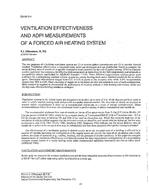
DA-88-03-4 — Ventilation Effectiveness and ADPI Measurements of a Forced Heating System
- Comments Off on DA-88-03-4 — Ventilation Effectiveness and ADPI Measurements of a Forced Heating System
- ASHRAE
The two purposes of a building ventilation system are (1) to remove indoor contaminants and (2) to provide thermal comfort. Ventilation effectiveness is measured using tracer gas techniques and age distribution theory to compare the actual delivery rates of outside air at specific locations to those projected for the case of perfect mixing ADPI is a thermal comfort parameter that compares the effective draft temperature as determined by dry bulb temperatures and airspeeds to acceptability criteria established by ASHRAE Standard 113(P). three different supply/return configurations were evaluated for a recirculating constant volumes ystemi n a steady heating modeu nder standard conditions for an office space. Ventilation effectiveness ranged from 0.57 to 0.76 at points in the occupied zone while ADPI measurements rangedf rom5 0%to 63%S. hort-circuiting of supplya ir to the return air inlet wase vident in tests of eachc onfiguration. Morer esearch is required to characterize the performanceo f existing systems in both heating and cooling modesa nd developm oree ffective btfilding ventilations trategies.
Units: Dual
Citation: Symposium, ASHRAE Transactions, 1988, vol. 94, pt. 1, Dallas, TX
Product Details
- Published:
- 1988
- Number of Pages:
- 11
- File Size:
- 1 file , 1000 KB
- Product Code(s):
- D-DA-88-03-4

